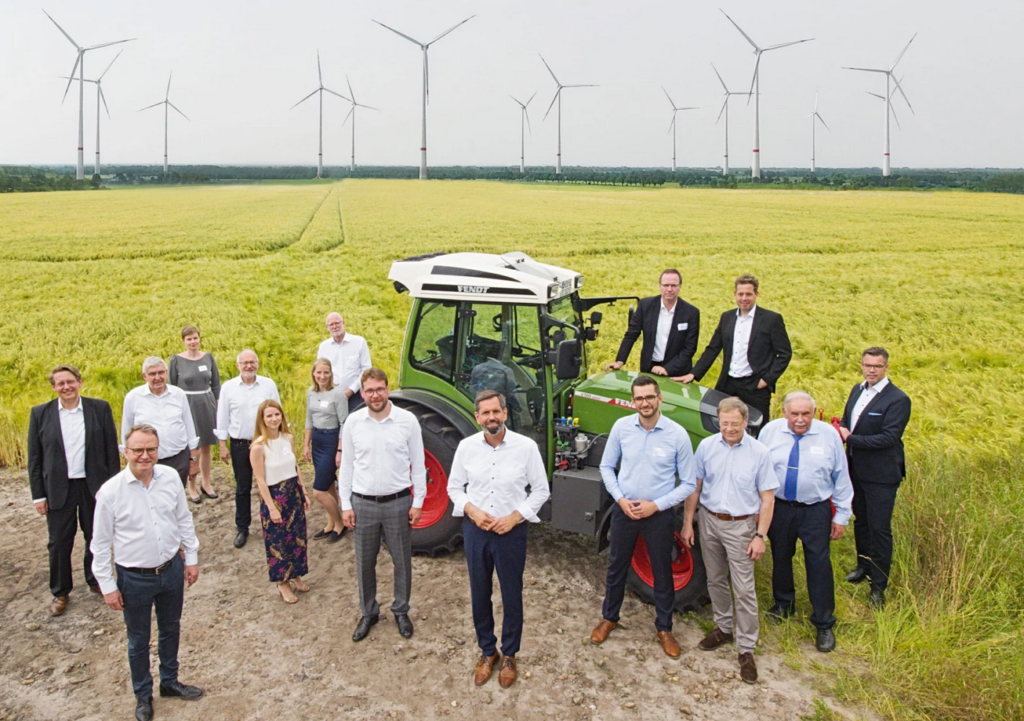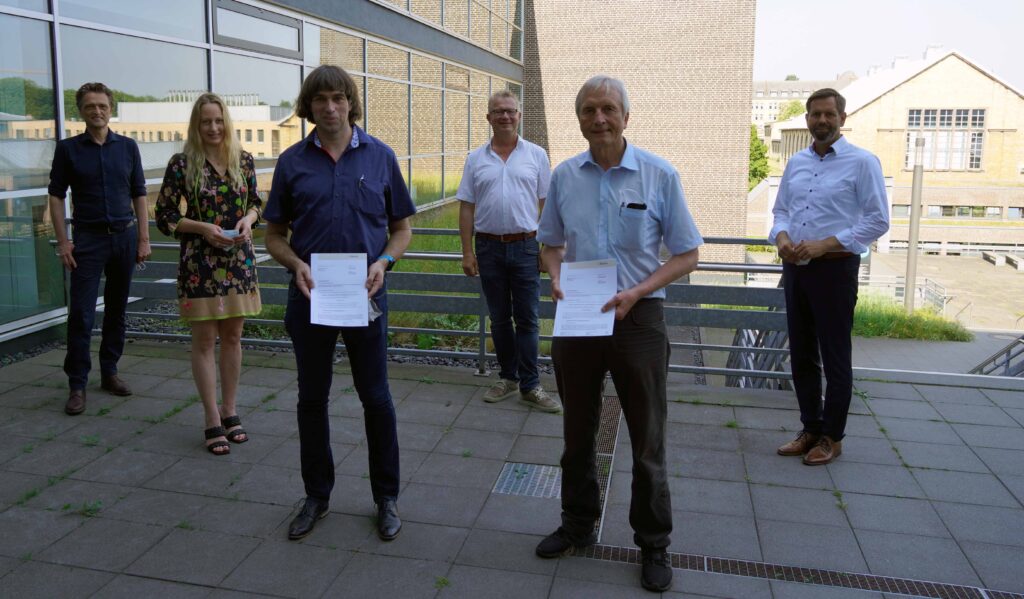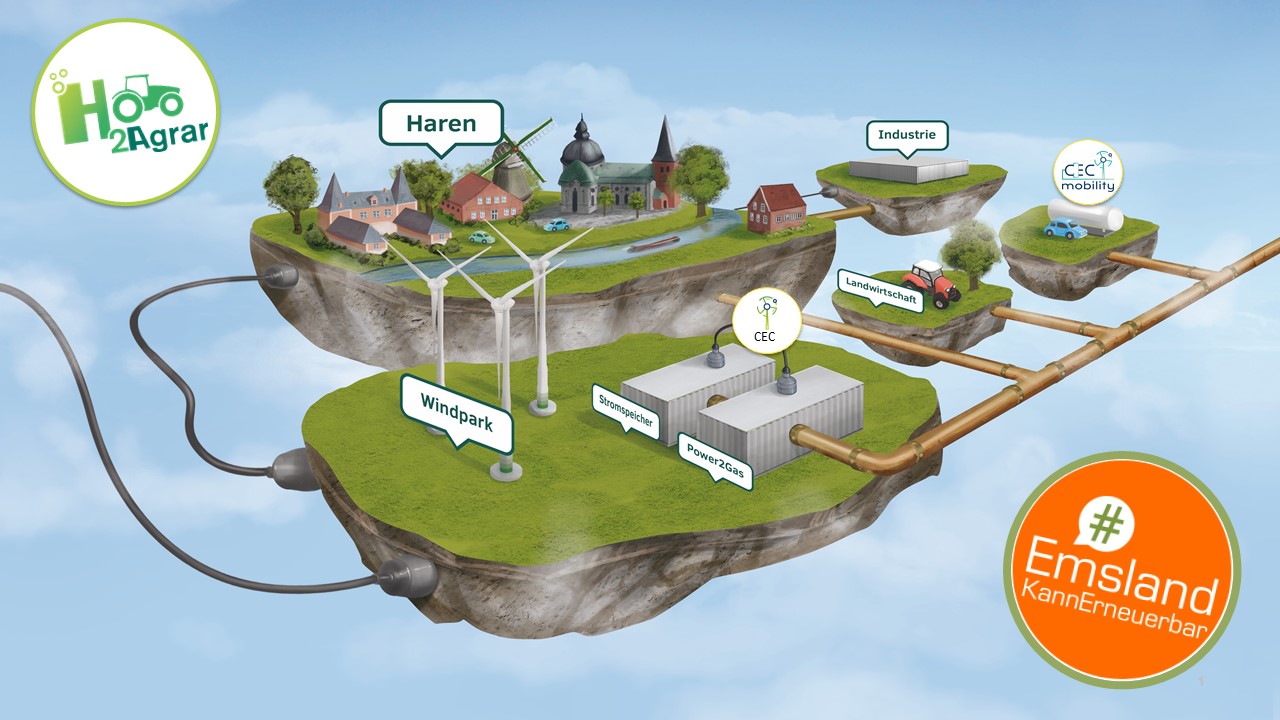Pressemitteilung
11,3 Millionen Förderung für Wasserstoffprojekte im Weser-Emsland
Niedersachsen unterstützt die ersten drei Wasserstoffprojekte im Rahmen der „Wasserstoffrichtlinie“ mit Landesmitteln in Höhe von insgesamt 11,3 Millionen Euro. Heute übergab Umweltminister Olaf Lies einen Förderbescheid in Osnabrück und gleich zwei in Haren. Mit der Wasserstoffrichtlinie fördert das Niedersächsische Ministerium für Umwelt, Energie, Bauen und Klimaschutz skalierbare Pilot- und Demonstrationsvorhaben der Wasserstoffwirtschaft.
Wasserstoff-Hub Haren
 ©agrowea
©agrowea
In Haren überreichte Umweltminister Olaf Lies heute die Förderung über 4,85 Millionen Euro für den Aufbau eines „Wasserstoff-Hubs“. Ziel ist die dezentrale Versorgung mit Wasserstoff aus erneuerbaren Energien sowie dessen Nutzung außerhalb des Stromsektors im ländlichen Raum. „Wir freuen uns, bei der Umsetzung dieses zukunftsweisenden Projekts durch die Planung, Entwicklung und Errichtung der Infrastruktur maßgeblich mitwirken zu dürfen“, betonte der Projektleiter und Geschäftsführer der CEC Haren GmbH & Co. KG Christoph Pieper.
Konkret will das Projekt Strom aus einem Bürgerwindpark speichern, teils in Wasserstoff umwandeln und dann beispielsweise als Kraftstoff für Landwirtschaftsfahrzeuge nutzen. Hierfür sollen unter anderem Batteriespeicher, ein Elektrolyseur für die Wasserstofferzeugung und eine Wasserstofftankstelle errichtet werden.
Des Weiteren soll ein Landmaschinenprototyp der Marke Fendt mit Brennstoffzellenantrieb in Vorbereitung auf eine spätere Serienfertigung entwickelt werden. So kann grüner Wasserstoff in der Landwirtschaft als CO₂-neutrale Dieselalternative bei Landmaschinen eingesetzt werden. Die Traktoren sollen den Treibstoff von der Wasserstofftankstelle in Haren beziehen. Für den Transport von Wasserstoff innerhalb der Modellregion entwickelt die Röchling Engineering Plastics SE & Co. KG spezielle Transportbehälter, die nach Projektende in drei Jahren auch europaweit vertrieben werden sollen. Insgesamt erhält das Projekt einen Förderzuschuss in Höhe von rund 2,8 Millionen Euro. An dem Projekt sind auch die Hochschule Emden/Leer und die Technische Universität Braunschweig beteiligt.
Innovative Landmaschine mit Brennstoffzellenabtrieb
Im Landkreis Osnabrück unterstützt Niedersachsen mit rund 3,67 Millionen Euro die Entwicklung einer wasserstoffbetriebenen Landmaschine des norddeutschen Unternehmens Kalverkamp Maschinenbau GmbH in Kooperation mit der Hochschule Osnabrück. „Es handelt sich dabei um ein vollständig neu- und andersartiges Fahrzeugkonzept, das wir von vornherein für die Wasserstoffnutzung konzipiert haben“, erläutert Geschäftsführer Klemens Kalverkamp. Statt Dieselmotor setzen die Entwickler auf einen Brennstoffzellenantrieb. Der Wasserstoff soll zukünftig idealerweise gleich vom Landwirt erzeugt werden, so dass ein regionaler Energiekreis entsteht. Im Prototyp namens „NeXaT2H2“ wird neben der Antriebsart auch eine weitere Innovation umgesetzt: Ein speziell entwickeltes Fahrzeugkonzept mit schmalen Bandlaufwerken verringert im Vergleich zu herkömmlichen Traktoren die Auflagefläche auf dem Acker und verhindert dadurch eine zu große Verdichtung des Bodens. An der Hochschule Osnabrück wird derzeit ein digitaler Zwilling des Prototyps auf alle erdenklichen Einsatzszenarien getestet, sodass die Markt- und Serienreife möglichst schnell erreicht werden kann.

V.l.n.r.: Hochschulpräsident Prof. Dr. Andreas Bertram, Anna Kebschull (Landrätin des Landkreises Osnabrück), Prof. Dr. Hans-Jürgen Pfisterer, Prof. Dr. Bernd Lehmann (Vizepräsident für Forschung, Transfer und Nachwuchsförderung), Klemens Kalverkamp (Geschäftsführer vom Maschinenbau-Unternehmen Kalverkamp), Minister Olaf Lies. ©Hochschule Osnabrück

Bleiben Sie informiert – mit unserem Newsletter „NWN direkt…“
Sie möchten über diese und andere spannende Wasserstoff-Projekte aus Niedersachsen informiert bleiben? Dann melden Sie sich bei unserem Newsletter an!
